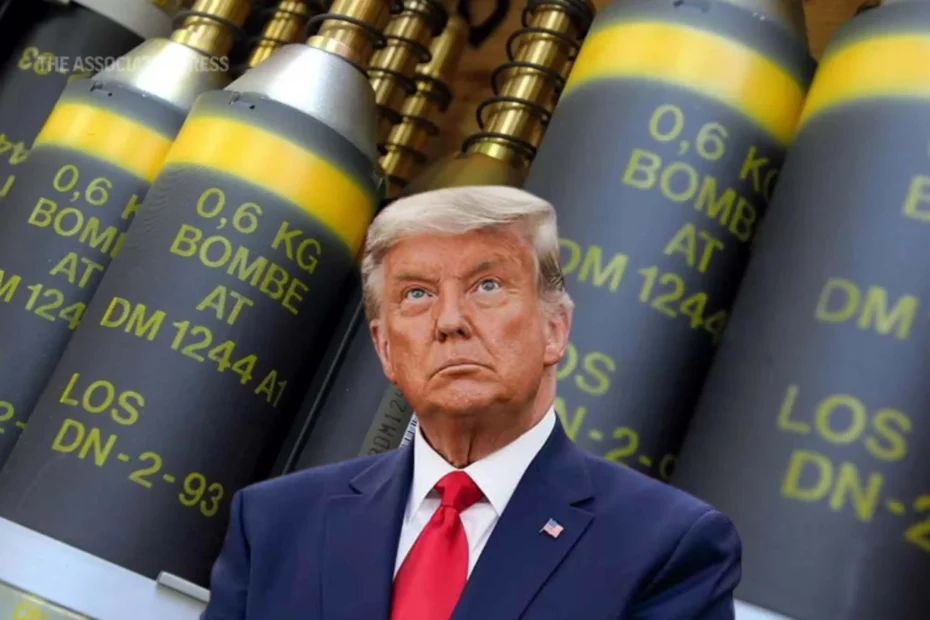Last updated on July 15th, 2023 at 02:56 am
In a recent announcement by the Defense Department, President Joe Biden’s decision to include cluster munitions as part of a new U.S. aid package to Ukraine has sparked intense controversy and garnered criticism from various factions.
Former President Donald Trump vehemently condemned this decision, warning that it could lead to World War III.
Trump, in a statement issued by his campaign, accused Biden of dragging the United States further into a destructive conflict and emphasized the need to end the war in Ukraine instead of exacerbating it.
“Joe Biden should not be dragging us further toward World War III by sending cluster munitions to Ukraine—he should be trying to END the war and stop the horrific death and destruction being caused by an incompetent administration. These unexploded cluster munitions will be killing and maiming innocent Ukrainian men, women, and children for decades to come, long after the war—we pray—has ended,” Trump said in a statement Tuesday.
For Latest Update- Click Here
Trump’s opposition to the provision of cluster munitions marks a notable shift from the policies enacted during his administration. In 2017, his defense secretary, Gen. Jim Mattis, canceled an Obama-era policy aimed at ending the use of most cluster bombs by 2018.
However, Trump’s stance aligns with the position held by numerous countries worldwide, as more than 100 nations have banned the use of cluster bombs due to their indiscriminate nature and the long-lasting threat they pose to civilians.
The decision to supply cluster munitions has also faced condemnation from NATO allies and even fellow Democrats. These weapons, known for their ability to cover vast areas upon explosion, can effectively target mass formations of soldiers but also pose a significant risk to innocent civilians due to the presence of unexploded submunitions. Many NATO nations are party to a treaty prohibiting the use of cluster bombs, underscoring the concerns raised by Biden’s decision.
Despite the backlash, President Biden and his security officials have defended the decision, emphasizing the necessity of supporting Ukraine’s counteroffensive campaign against Russian forces. Secretary of State Antony Blinken justified the provision of cluster munitions as a decision of last resort, driven by supply constraints. Blinken argued that the stockpiles of unitary munitions in Ukraine and around the world were rapidly depleting, leaving the country defenseless if ammunition ran out.
“The stockpiles around the world and in Ukraine of the unitary munitions, not the cluster munitions, were running low. They’re about to be depleted,” Blinken said in an interview with NBC’s Andrea Mitchell. “The hard but necessary choice to give them the cluster munitions amounted to this: If we didn’t do it, we don’t do it — then they will run out of ammunition. If they run out of ammunition, they will be defenseless.”
As the war in Ukraine continues to unfold, Biden’s decision to provide cluster munitions will undoubtedly have significant implications. The controversy surrounding this move not only shapes U.S. foreign policy but also impacts international relations, particularly within NATO.
With Biden’s attendance at a NATO summit in Lithuania, the provision of cluster munitions remains a contentious topic of discussion among world leaders and further highlights the challenges in striking a balance between supporting Ukraine and minimizing civilian risks.
The debate over the use of cluster munitions and its potential consequences for Ukraine’s conflict persists, with Biden’s decision drawing both support and criticism.
The ongoing situation underscores the complexities and difficult choices involved in navigating geopolitical conflicts and ensuring the protection of civilians in the midst of warfare. As the conflict in Ukraine unfolds, the world will closely monitor the implications of Biden’s decision and its long-term effects on the region.
